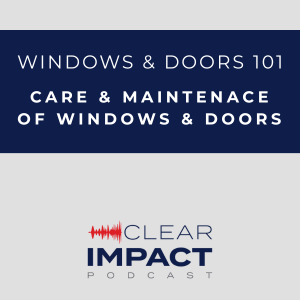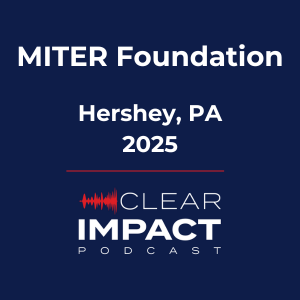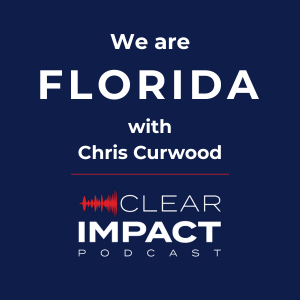Episode Transcript
[00:00:00] Speaker A: Foreign welcome to the Clear Impact Podcast brought to you by Mitre Brands University. Thanks for joining us today. My name is Sheri Conner and I am your host.
Well, good morning. We are here on the Clear Impact Podcast and we are recording in Tacoma, Washington this week. We've been just chatting it up with a bunch of people here at the Tacoma Support center, tsc, which is in downtown Tacoma. And it's been lovely. We've had some great conversations and I reached out about three weeks ago to say, hey, I'm coming in, I need a space. Also, can somebody take my case when it arrives? And Eric Ballard was wonderful enough to help facilitate that for me. So we've had some great conversations and I said, hey, why don't we record one of these great conversations? So here he is. So welcome to the podcast, Eric.
[00:01:05] Speaker B: Thank you.
[00:01:06] Speaker A: Thanks for making some time this morning. So we're just kind of doing some introductions. So tell us a little bit about you as far as your career path and what you do here at Milgard, Mitre Brands.
[00:01:18] Speaker B: Yeah, so I've been in HR for probably around 17 years, give or take. Started in HR at Starbucks for many years there. I was actually at Starbucks for probably a total of 12 years or so in HR. And while I was there did a lot of different types of HR work, a lot of very specialized work up in the corporate office at Starbucks for the entire company and then transitioned from there into a job at Amazon working in a actual warehouse, an Amazon warehouse. So kind of made that shift from kind of the corporate HR into more direct HR generalist support in the warehouse. Amazon was, as you can imagine, very different. Talking about a very large company. So a lot of challenging aspects to a very fast paced company that is very focused on the bottom line and stockholders being happy and all that.
So ultimately ended up getting an email from one of the recruiters here at Milgard. And I grew up in this area, so knew the Milgard name very well. The Milgards being from Tacoma, are kind of their names plastered on lots of different buildings in the area. So knew it was a really good company, knew it had a lot of good roots in Tacoma, so ended up making that transition to a company that was a lot more focused on the people. So made it really nice as a HR professional to be focused on those relationships and the people that you're working for. So been working at Pultrusion for the last few years, helping that plant down there in Fife, and then just about six months ago or so transitioned to this job here providing Support to our OP support center, as well as kind of ops support across the company. So ops support is kind of one of those gray areas that we don't really understand 100%. But OPS support really kind of refers to all the people that are supporting the operations rather than actually involved in the operation group making the Windows, it, finance, hr, sales, service. And in my role, I support those groups directly and then also indirectly through a lot of our HR teams that are in the plants. So those OP support people that are located in the plants get a little double help from me as well as the HR teams there in the plants themselves. So that's kind of, in a nutshell, what I do.
[00:03:31] Speaker A: Okay, and so how long have you been with Milgard?
[00:03:34] Speaker B: Been with Milgard since the end of 2022, so just about three years.
[00:03:39] Speaker A: Okay. And so with the acquisition, because we talked about this a little bit this morning, so obviously coming from PGT Legacy, our operation, like the HR side of things, has seen a pretty significant shift just in terms of who we report to and who our leadership is. And some of the, like, even the payroll, like, okay, you're not getting paid every week, you're getting paid every other week. You know, just minor things like that, some of the bonus structures and some of those alignments. But our acquisition has impacted you as well, right? So, like, what kinds of things are you working on now? Like in terms of getting everybody in alignment without getting too detailed?
[00:04:21] Speaker B: Yeah, well, I actually, when I started, we were kind of still going through a lot of the turmoil of the acquisition of Milgard. So we're still kind of trying to align a lot of that stuff between MI and Milgard. So we were kind of just getting to a point where we thought maybe the light was at the end of the tunnel when we had the announcement of the acquisition of pgti. So I think it was kind of one of those things like, okay, let's take what we learned and start again and start integrating pgti. I think one really nice thing has been that the HR team itself has integrated very well. It feels like we've known our HR counterpart across the company for a long time, even though it's really only been a little over a year now. But I think that's really helped in terms of being able to then get some of this work, work done and really kind of work together as a team towards that goal of integrating the companies. So we've been doing lots of different integration across the company. System wise, we've been integrating the HR systems together, and that's Been a little bit rough here and there, but again, building on that teamwork, we're able to move forward and get UKG integrated into one system. And then, of course, as we like to kind of make things tough on ourselves, we immediately decided to start integrating further to workday. So I think that will help kind of iron out some of the rough patches. When you try to integrate two different versions of KG into one, it's not going to work 100% smoothly. So moving into workday, I think will really help kind of streamline some of that. And then beyond that, we're also really working on integrating lots of our policies with our payroll, getting that all onto one system, getting it all onto one schedule, doing different integration of our handbooks and our policies, trying to align those. We were still working on some of that between MI and Milgard, so I think we're continuing that work of integrating MI and Milgard as well as then integrating PGT itself, but also the other kind of smaller brands that kind of came along with pgt.
[00:06:09] Speaker A: Right. Because we weren't aligned either. I mean, we were on, I think, the UKG system, but I think everything else was still separate. So it wasn't just that you acquired one company, you acquired a bunch of companies because there's Anlin, Western, pgt, cgi, Windor. We just divested Easy Breeze just recently.
And then prior to that, there were also Martin, Garage Door and there were several others. So there was a whole cluster of companies that were all doing business separately under one umbrella. And then. Yeah, so that's a lot.
[00:06:43] Speaker B: Yeah. And it's been a challenge. It's been exciting, but also a big challenge. I think my role here in Tacoma, being on the west coast, I've been working a lot with Western and Anlin in particular, and very different even from PGT and even different from each other, Inland and Western. So working with those HR teams, again, it's been a challenge to get it all aligned, but I think we've got really HR teams at both of those buildings as well as all the other locations that we have. And it's made it really enjoyable to some extent, as enjoyable as these things can be enjoyable to work with those teams and integrate and figure out how do we move forward, how do we align these things and how do we take the best of both worlds. Because as great as MI and Milgaard were, we weren't necessarily the best in class in everything that we were doing.
[00:07:32] Speaker A: Sure.
[00:07:32] Speaker B: So taking some of those things, in particular, some of our great talent and development stuff, that's been going on at PGT for, for a long time. Taking that and integrating it into Mitre brands and learning from both sides of the company to take the best of both world and build a stronger company overall.
[00:07:48] Speaker A: Yeah, no, that's the idea. Right. And so as we've been talking, we were kind of trying to figure out which of the letters in the MITRE acronym your role best supports. And I think it's really multiple. Right. So trust, obviously, because your team members have to be able to trust the company that they're working for. You don't want to feel like you walk in to work that day and you might be asked to clear off your desk and exit. You don't want to feel like that experiences. Right. Because you want to be able to know where, like how to access your time off and how to research your pay and how to find out what your benefits are and things like that. And then obviously the relationships, right?
[00:08:30] Speaker B: Yeah, I think, I mean the relationships is a huge one and I kind of mentioned it already, but the relationships that we, that we've very quickly built within the HR team have allowed us to really quickly integrate things and work together very quickly to get things aligned as much as we can. But to your point, they're not independent from one another. And those relationships are built on a foundation of trust and building trust between our HR teams. Knowing that I'm helping ops support, but at the same time, I've got these local HR teams. They need to trust that I'm there to help them not stepping on their toes, that we're going to work together and utilize those relationships to work together to improve all the things that we're doing. And then trust from our team members, we're making lots of changes, we're doing lots of things. It's a very stressful time for all sides when things are changing and suddenly you're now reporting to somebody from one of the other sides of the country or your organization is completely changing and being restructured and everybody's jobs are changing and evolving and growing. You need to trust that even though it might be stressful and rocky, that at the end of the day you're going to be taken care of and that the company has your best interests at heart.
[00:09:39] Speaker A: Right.
[00:09:39] Speaker B: And that in the long run we're going to be a stronger company on the other end of it.
[00:09:43] Speaker A: Yeah, well. And especially after coming from such a large organization like Amazon and we were publicly held too. And so it did have a different feel than more of a family owned. Even though it's 10,000 team members. Right. Is it 10,000?
[00:09:58] Speaker B: Just under 10,000, yeah.
[00:09:59] Speaker A: Right. And you mentioned something earlier today that I didn't know. How many states do we have employees?
[00:10:04] Speaker B: Yeah. So across the entire company, we are currently in 41 of the 50 states.
[00:10:09] Speaker A: Wow.
[00:10:10] Speaker B: Yeah.
[00:10:11] Speaker A: That's wild.
[00:10:12] Speaker B: A lot of that is sales and service. We've got to be spread out and be in their different markets. But even more and more, all the time we have people that are working remotely in very specialized roles. As we continue to evolve and innovate, we are utilizing technology more and more to support our customers and support our team members. And that requires people that have very specialized skills in different systems. So sometimes you find that person in Oklahoma.
[00:10:37] Speaker A: Right.
[00:10:38] Speaker B: And you need to make sure that you're finding the best people to support this company.
[00:10:41] Speaker A: And every state has different employment rules and different, you know, like Florida doesn't have a state income tax, so we don't have that. But in other states, obviously there is. And so even on payroll and things like that, everything has to be different. And so that's a huge amount of work. I love the perspective of that. Making sure that the trust is there and the relationships are there. I think that's so vital because no one wants to feel like they don't matter when they come to work. Right. Everybody wants to feel like it makes a difference. If I showed up today and how did I further the bottom line? How did I impact a customer experience? How did I improve something that was maybe not so great? So everybody wants to feel valued and appreciated, and that's different depending on where you are and what you're doing. Right. So it's a very broad thing. When you have 10,000 different people, that's incredible. So just one fun question, because we are the learning team for customer education as Miter Brands University. I love to know what people are learning about. So what's something interesting or cool or even weird that you've been learning about lately?
[00:11:49] Speaker B: Well, as I said, I kind of moved into this role about six months ago, give or take. And prior to this, there really wasn't somebody in my role. This was kind of a new role that was created as we continue to evolve and we have more and more team members and more ops support, you know, making sure that we're providing that support, creating a good experience for all of our team members all around the country. They created this position and I've kind of had to learn on the fly about what my job is and learn how to navigate those relationships with the local teams. That were doing a lot more kind of on their own. They didn't have the support of my position previously.
Learning about the company as a whole. Prior to this, I was working in a manufacturing location and I knew that location inside and out, but I didn't really know all of the other parts of the business and building those relationships and learning about other people's jobs, learning about how they're doing the work that they're doing, understanding what their roles are and understanding who they are as people and what they are looking for and what their challenges and their troubles are on a day to day basis. That's been really exciting. I think it's been a growth experience for me getting a. A much broader perspective of the company as a whole, but also very rewarding as I continue to build relationships across the company and get to know people that maybe I wasn't able to from my spot there in the manufacturing location.
[00:13:11] Speaker A: Yeah, it's always good to continue to evolve and that way you don't get bored.
[00:13:14] Speaker B: Yeah, it keeps things interesting.
[00:13:16] Speaker A: Sure.
[00:13:16] Speaker B: It's definitely interesting times right now. And I think the more that we can do to work together and get through this all together as a team, I think the happier we'll all be.
[00:13:24] Speaker A: And now you've learned that recording a podcast isn't that big of a deal.
[00:13:27] Speaker B: No, not as, I guess, intimidating as it first seems.
[00:13:30] Speaker A: Yeah. But anyway, Eric, thank you so much for your time today. I appreciate you hosting and providing a space and handling the box and all the things. So thank you.
[00:13:40] Speaker B: Yeah, that was all new stuff for me as well. And again, it's always enjoyable to meet people and learn about what they do and understand all these little parts of our business.
[00:13:48] Speaker A: Yeah. Awesome. All right, have an amazing day.
[00:13:50] Speaker B: Yeah. Thank you.
[00:13:51] Speaker A: Take care. Bye.
The Clear Impact podcast is brought to you by mitrebrand University. We are a part of Mitre Brands, a family of leading window and door brands united by our passion for quality and relentless pursuit of 100%. At Mitre Brands, our common purpose is to deliver value by manufacturing the finest products, services and customer experience every day everywhere. Our window indoor brands deliver regionalized expertise, products and services, all backed by a national company.
Mitre Brands University is here to educate you, our listener, so that you can be a more informed consumer of window and door products.


